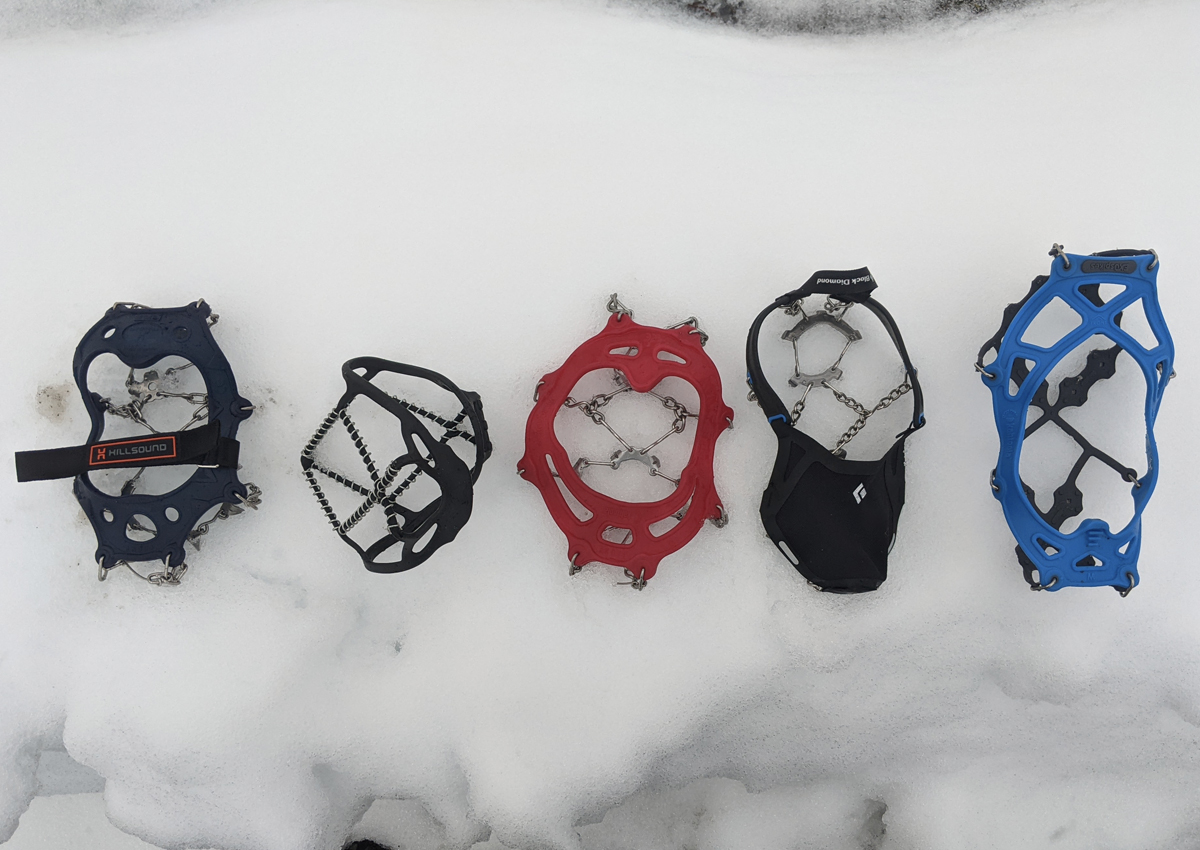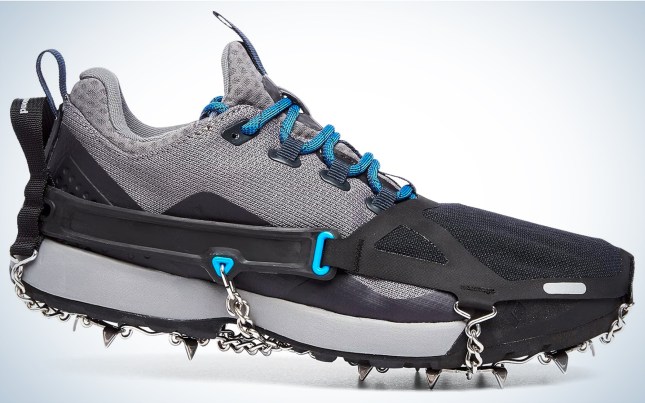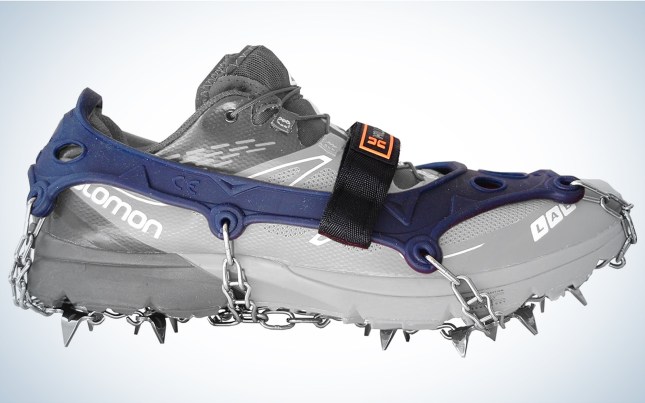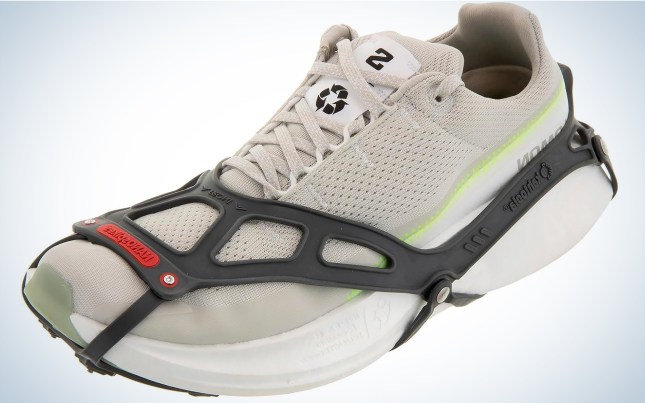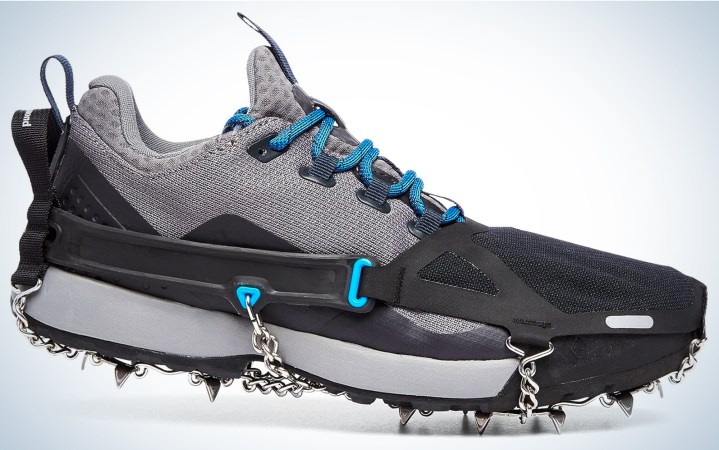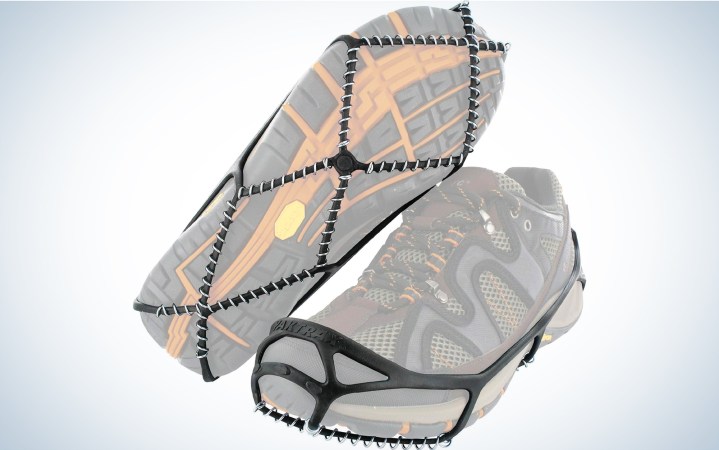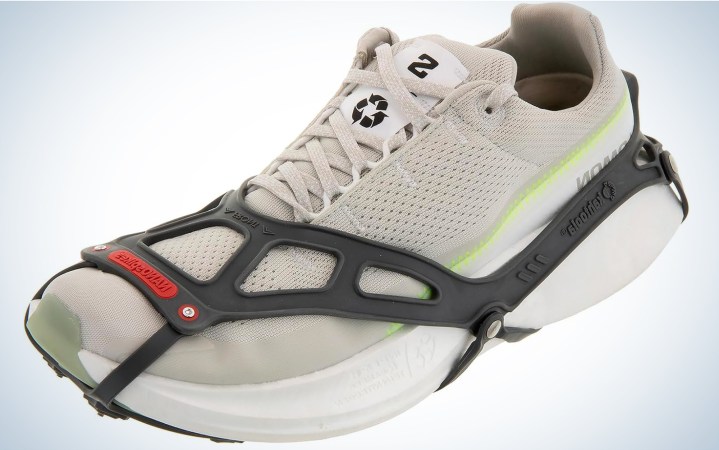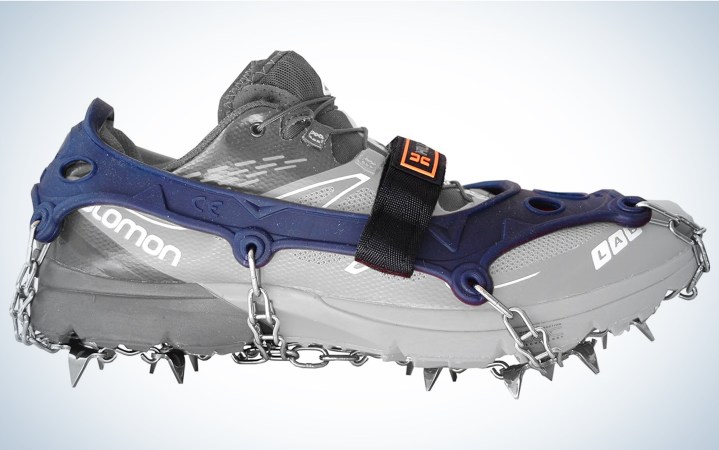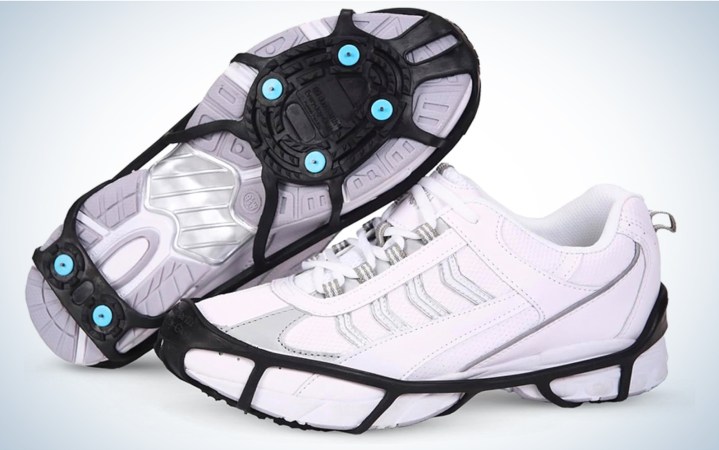We may earn revenue from the products available on this page and participate in affiliate programs. Learn More ›
Ice cleats are a must-have accessory for winter adventuring. Too many hikes have been cut just short of their final destination due to a patch of ice right before the apex of the summit. Having some traction throughout the journey will help you hike faster and with increased confidence. But with so many options out there, how do you know which one is the right choice for getting your mail or a trail run over mixed terrain? To help you decide, I checked out options from Kahtoola, Hillsound, Yaktrax, Due North, and Black Diamond to find the best ice cleats.
- Best Overall: Black Diamond Distance Spike
- Best for Patchy Snow: Yaktrax Walk
- Best for Patchy Ice: Kahtoola Nanospikes
- Best for Compact Snow: Hillsound Trail Crampon Ultra
- Best Budget: Due North Everyday G3 Traction Aids
How I Tested the Best Ice Cleats
I tested the best ice cleats for fit, weight, ease of use, durability, and performance on snow and bare ground. Fit was assessed using both a Zamberlan 1025 Tofane NW (one of my picks for the best hiking boots), to get a sense of how easy or difficult it was to fit over higher volume shoe and the Xero Mesa, one of the best barefoot shoes, to see the full range of fit. During this process, I also checked the weight of each pair I was testing (sized to pair with a women’s 9 shoe).
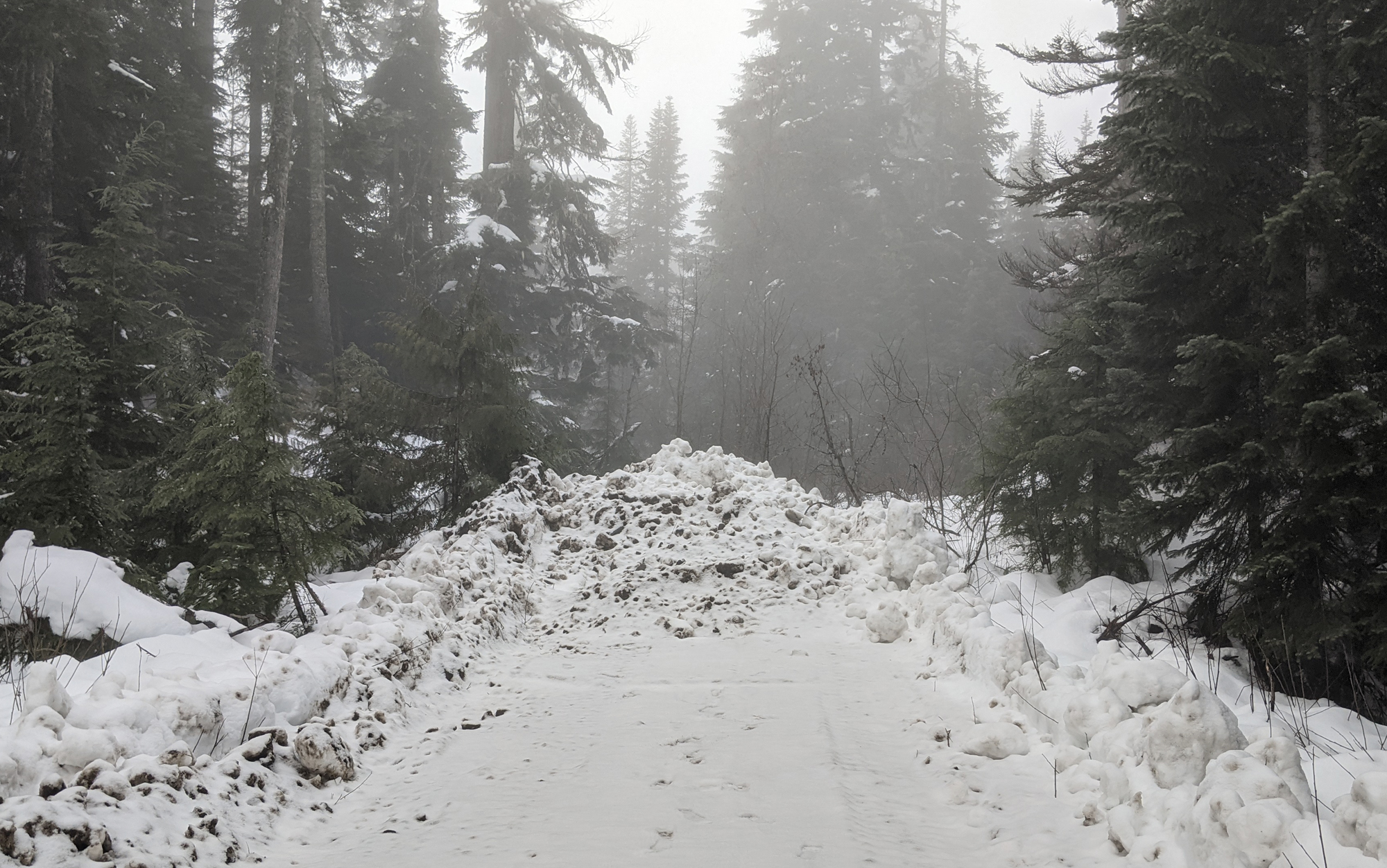
Laura Lancaster
Field testing was conducted using the Xero Alpine, which I can comfortably hike and jog short distances in, at Snoqualmie Pass in Washington State in December. Unfortunately, due to unseasonably warm conditions, I was not able to test the ice cleats on ice, but plan to return to cover this at a later date when temperatures drop low enough to allow for it. As part of my testing, I checked to see how much snow each set of spikes would hold onto when stepping repeatedly into fresh snow.
Specs and Testing Results
| Product | Price | Weight | Fits | Spike Length | Warranty | Test: Ease of Use | Test: Snow | Test: Bare Ground |
| Kahtoola Exospikes | $65 | M: 7.4 oz | M’s 5-14 W’s 6-13 | .29” | 2 years | Fair | Fair | Great |
| Kahtoola Nanospikes | $55 | M: 7.5 oz | M’s 6-13 W’s 5-12 | N/A | 2 years | Easy | Fair | Great |
| Kahtoola Microspikes | $75 | S: 12.1 oz | M’s 5-14 W’s 6-12 | .38” | 2 years | Fair | Great | Poor |
| Yaktrax Walk | $25 | S: 3.9 oz | M’s 1-13 W’s 3-15 | .05” coils | 1 year | Easy | Fair | Great |
| Hillsound Flexsteps | $75 | XS: 11.3 oz | M’s 6-15 W’s 5-14 | .25” | 2 years | Poor | Good | Good |
| Hillsound Freesteps | $65 | XS: 13.3 oz | M’s 6-15 W’s 5-14 | .25” | 2 years | Fair | Good, | Fair |
| Hillsound Trail Crampon Ultra | $90 | XS: 13.2 oz | M’s 6-15 W’s 5-14 | .67” | 2 years | Poor | Great | Fair |
| Due North Everyday G3 Traction Aids | $17 | S-M: 4.5 oz | M’s 3-14 W’s 5-10 | .13” | 1 year | Hard | Poor | Good |
| Black Diamond Distance Spike | $100 | M: 7.9 oz | M’s 6-15 W’s 4-13 | .31” | 2 years | Easy | Good | Good |
I also considered price and warranty in determining which was the right pick for a variety of activities.
The Best Ice Cleats: Reviews & Recommendations
Best Overall: Black Diamond Distance Spike
Key Features
- Price: $100
- Fits Sizes: Men’s 6-15, women’s 4-13
- Spike Type and Material: .31” stainless steel spikes
Pros
- Easiest pair to pull on in my test
- Surprisingly comfortable on firm ground
Cons
- Expensive
If I was going to have only one pair of ice cleats in my closet, it would be the Black Diamond Distance Spikes. During testing, it proved to have an unmatched balance of grip on compact snow while still feeling comfortable to wear on bare ground for long stretches. If you’ve ever been hiking on snow, you know that one of the most frustrating parts is having to repeatedly put on your ice cleats and then take them off again as conditions change. But the pattern and placement of spikes on the Black Diamond Distance Spikes were comfortable enough to get you to that next snow patch.
But what really sold me on this pair was that they were just so easy to take on and off. With other spikes, you have to muck around with a loose mass of silicone and steel to figure out where the toebox is. The Black Diamond Distance Spikes have a fabric pouch at the front so you know exactly where your toe goes and, even better, a pull tab at the back, so that they’re easy to pull on. And they manage all these extra details while still coming in at a competitive weight and a very small packed size.
I had some durability concerns about the fabric upper, but when I tried to run the spike underfoot across it and through it (mimicking stepping on your own foot), it didn’t even come close to puncturing it. The one true downside to these is price. If you’re out on the trails on a regular basis in winter, this is a worthy investment. But if you’re just looking for something to get you to the mailbox, one of the other picks on this list might be a better choice.
Best for Patchy Snow: Yaktrax Walk
Key Features
- Price: $25
- Fits Sizes: Men’s 1-13, women’s 3-15
- Spike Type and Material: .05” steel coil
Pros
- Affordably priced
- Comfortable to wear on firm ground
- Easy to pull on
Cons
- Not enough traction for steep snow
If you’re looking for something low-key to get you across flat surfaces covered by intermittent patches of compact snow, the YakTrax Walk is an excellent choice. During testing, it was exceptionally easy to put on, and comfortable on firm ground. It was also one of the least expensive options I looked at. The downside here is that these do not offer enough traction on steeper surfaces.
Best for Patchy Ice: Kahtoola Nanospikes
Key Features
- Price: $55
- Fits Sizes: Men’s 5-14, women’s 6-12
- Spike Type and Material: .38” tungsten carbide nubs
Pros
- The most comfortable option I looked at on firm ground
- Fairly easy to pull on
Cons
- Not great on steep compact snow.
There are three styles of ice cleats: spikes, car chains (think YakTrax), and what I’ll call nubs. The advantage of spikes is that they can really grip the ground, giving you surprising stability on steep surfaces—sometimes even more than what you would expect in your normal hiking boots on dry ground. But, the better they are at gripping snow, the more they feel like hell to walk on bare ground in. Nubs, on the other hand, do a great job of providing traction on icy surfaces but do not provide as much traction on steep compact snow. They tend to be less uncomfortable on hard ground.
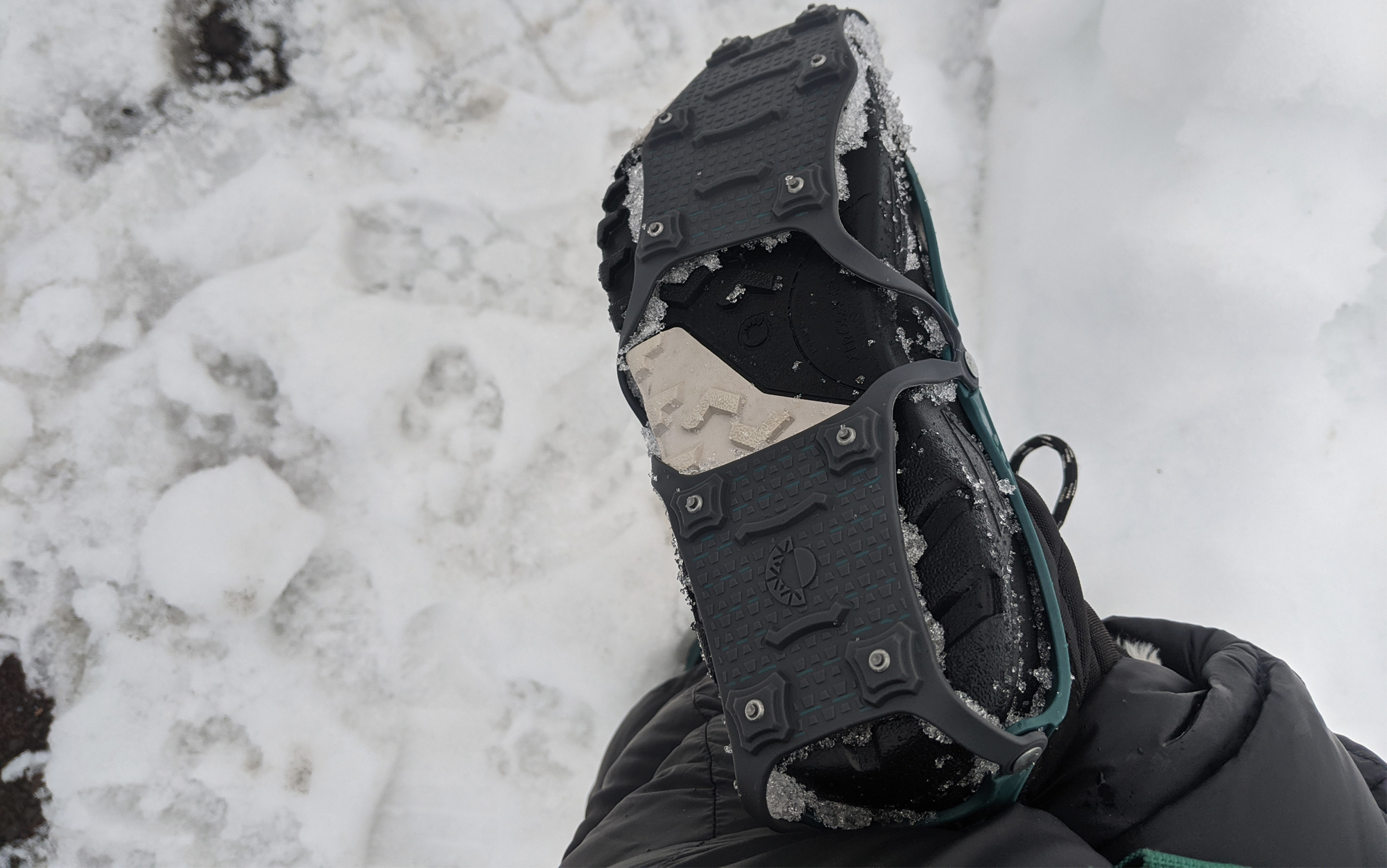
Laura Lancaster
The Kahtoola Nanospikes were the best of the nub-variety ice cleats I tested, and would be an excellent choice for anyone walking or running longer distances on patchy ice. These were surprisingly easy to pull on, some of the easiest in my test, and were the most comfortable pair I looked at to stand on firm ground in. The ten carbide tungsten nubs underfoot will provide plenty of traction in icy conditions.
Best for Compact Snow: Hillsound Trail Crampon Ultra
Key Features
- Price: $90
- Fits Sizes: Men’s 6-15, women’s 5-14
- Spike Type and Material: .67” stainless steel spikes
Pros
- Best grip on compact snow in my test
Cons
- Expensive
- Annoying to pull on
If you’re planning a long hike on consistent compact snow, then you want a pair of the Hillsound Trail Crampon Ultra. In fact, I’d wager that plenty of people hiking on popular trails in the best snowshoes would be far better off with a pair of the Trail Crampon Ultras. While snowshoes are a must for hiking around on soft, fluffy snow, most people will be out on more popular trails that have already been tamped down by other hikers. In those instances, you just need grip, not a flipper, and that’s where these ice cleats excel.
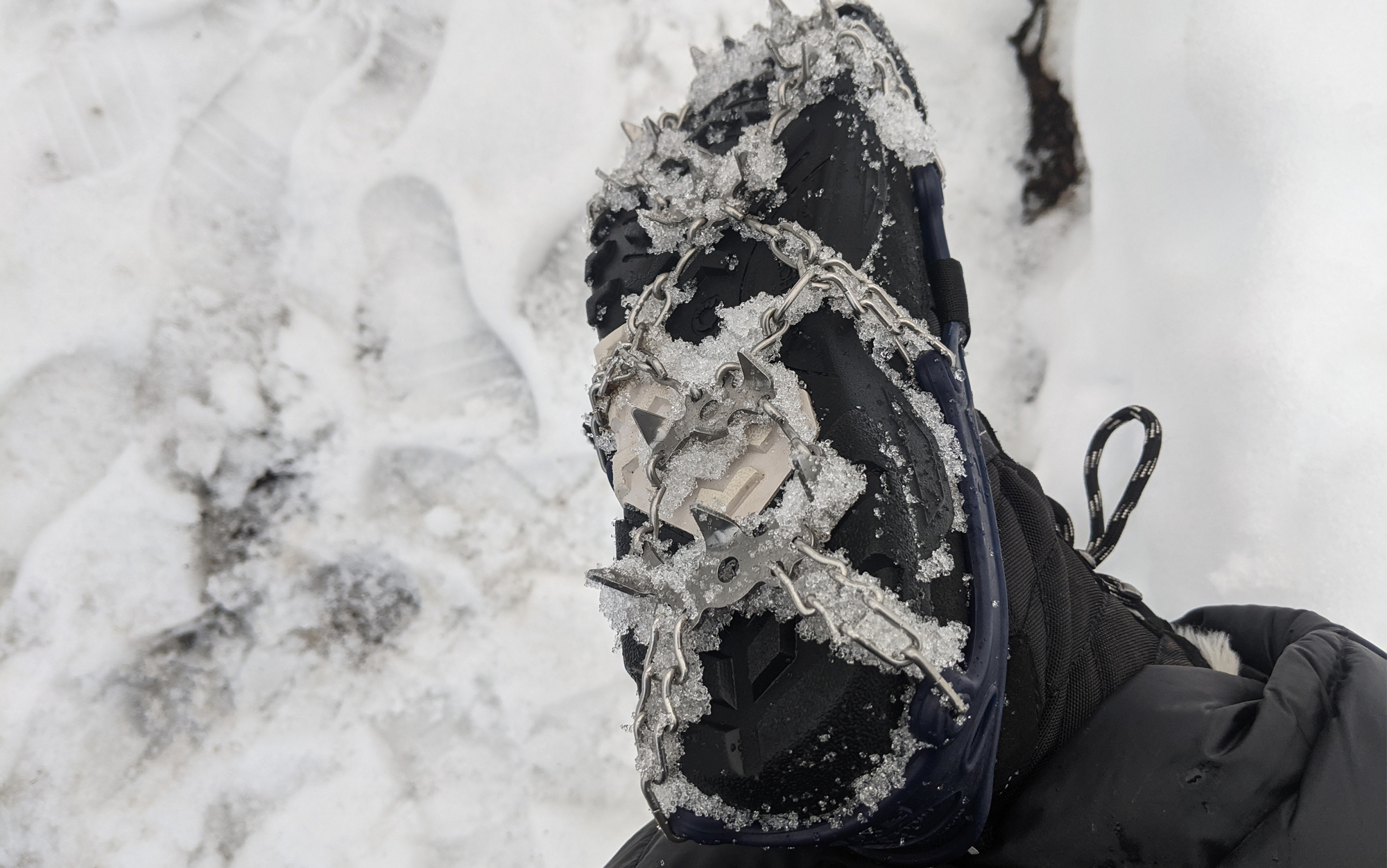
Laura Lancaster
While testing the Hillsound Trail Crampon Ultra, I could feel the grip with each step, even compared to other best-in-class options like the Kahtoola Microspikes. This made it so that I could walk with confidence on steep, compact snow. Finally, these picked up somewhat less snow than the Kahtoola equivalent (although still more than options with shorter spikes or nubs). They were also a hair more comfortable to walk on bare ground in. The one area where they did not beat out the Kahtoola Microspikes was in ease of use: these were one of most difficult pairs to put on that I tested.
Best Budget: Due North Everyday G3 Traction Aids
Key Features
- Price: $17
- Fits Sizes: Men’s 3-14, women’s 5-10
- Spike Type and Material: .13” tungsten carbide nubs
Pros
- Very affordable
- Reasonably comfortable on bare ground
Cons
- Difficult to put on
- Not great traction on steep compact snow
If you’re looking for an affordable pair of ice cleats to handle the next ice storm , this cost-effective version from Due North is a great pick. While it is not the best choice for compact snow (especially steep compact snow), the nubs will grip on ice without aggravating your feet when you hit a patch of bare ground.
How to Choose the Best Ice Cleats
Price
The ice cleats I looked at ranged from less than twenty dollars to as much as one hundred dollars. Consider your budget before making a final choice.
Holding Power
While people sometimes use the terms ice cleats and crampons interchangeably, you should not attempt to use ice cleats if you are headed into conditions (such as glacier travel) that require true crampons. Typically, ice cleats are lighter weight and are easier to put on than crampons, but have less holding power and no spikes at the toes that could be used to kick into a glacier.
Ease of Use
I was impressed at how easy some of the spikes in my test were to put on. Others were a bit of a struggle. Take into consideration your patience level when making a final choice.
FAQs
If you are purchasing ice cleats to wear with heavy-duty hiking boots, size up. If you are purchasing spikes to wear with your running shoes or something similarly low profile, you can stick with your usual size.
Whether or not you should carry crampons or ice cleats depends on what you are doing. Crampons are designed to have long, sharp spikes with excellent holding power on ice. If falling on your route could spell disaster, go with crampons.
Read Next: The Best Crampons
You can walk on rocks with spikes, but expect it to feel less comfortable than without any kind of traction device on. Typically, the chain style or nub style of ice cleats will work better on rock and snow or ice conditions than a true spike.
You can use spikes in snow; however, there are a few things to keep in mind. The first is the depth of the snow. Hard-packed snow, such as you’ll find on popular trails in winter, is a great choice for ice cleats. Soft, deep snow—think your backyard after a big snow—is typically not a great choice for spikes: when you take a step, you will simply sink. A better choice for deep snow is a pair of the best snowshoes.
Some spikes are more prone than others to collecting snow underfoot, which can make your foot heavier and make it more difficult to walk.
Final Thoughts on the Best Ice Cleats
If you’ve been avoiding winter activities due to a lack of traction, a pair of the best ice cleats will have you hitting the trails with confidence. They are even a useful tool for casual activities. Plan to grab a pair for getting the mail or taking your dog for a walk, especially if you live in an area prone to ice storms.
- Best Overall: Black Diamond Distance Spike
- Best for Patchy Snow: Yaktrax Walk
- Best for Patchy Ice: Kahtoola Nanospikes
- Best for Compact Snow: Hillsound Trail Crampon Ultra
- Best Budget: Due North Everyday G3 Traction Aids
